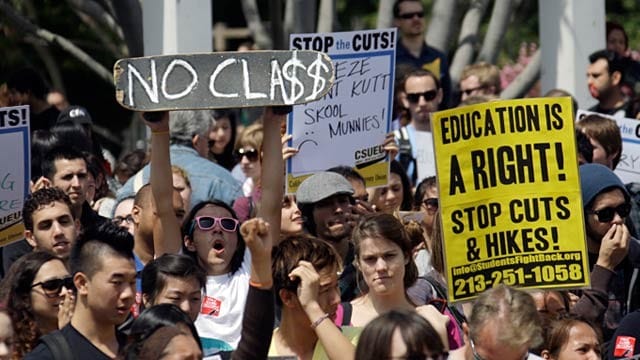Cal States Freeze Enrollment, Raise Executive Pay


California State University system plans to close its doors to qualified students for the upcoming spring term, while fall enrollment numbers will depend on the outcome of a tax initiative, say officials. Only 8 of the CSU campuses will be accepting transfer students this spring, and none of the campuses will be accepting new freshmen. Last year approx. 16,000 applicants enrolled for the spring term out of nearly 70,000 applicants. This year, the number of admitted applicants will be reduced to a few hundred.
The decision to cut enrollment comes in response to $750 million in funding cuts made during the 2011-12 fiscal year. CSU officials have warned that next year’s enrollment numbers will be dependent on the outcome of a proposed tax initiative on the upcoming November ballot. Their resolution puts pressure on voters to support the tax measure.
Cuts in admissions numbers will affect fall 2013 applicants as well. Fall applicants will be warned upon applying, that their admittance will depend on the result of the measure. The university system is prepared to reduce enrollment by up to 25,000 if the tax measure is rejected. On average 90,000 students enroll each year out of 700,000 applicants. Out-of-state students, who pay significantly higher tuition prices, will most likely not be affected.
If the tax proposal fails, the CSU system will face at least another $200 million in cuts next year.
At the same time, in the face of these drastic cuts to funding and admissions, the university has received strong criticism of pay increases awarded to university presidents. On Tuesday, CSU trustees approved 10 percent pay raises for two campus presidents, bringing their salaries to more than $300,000 annually. This decision was made despite criticism from Gov. Jerry Brown and complaints from faculty and students across the state.
Yesterday, the Senate Education Committee rejected a bill that proposed limits to pay increases for CSU executives. Senate Bill 976 would have capped the salary of any university executive to no more than 5 percent higher than his or her predecessor. The bill would also prohibit any salary increase for university executives for 2 years in which tuition was rising or state funding being reduced.
Critics of the bill claimed it would set a bad precedent for the micromanaging of university affairs. Nonetheless in light of the current climate facing CSU campuses, the rejection of this bill sends a harsh message to students.
“Unfortunately, the Education Committee has sent the completely wrong message," stated state senator Leland Yee, who introduced the bill. "Rather than stand up for students and faculty, they protected the 1 percent and condoned CSU's bad behavior.”
The bill would have asked University of California regents to abide by the same regulations as the CSUs.
These pay increases come at a time when CSU tuition has more than doubled, from 5 years ago. Recent headlines focused on how an Ivy League education is now more affordable for middle-class students than an average Cal State University bill. CSU tuition is $5,472 for the 2011-2012 year, nearly $3,000 more than tuition was in 2007. Despite protests from CSU students across the state, a further increase in tuition has been approved for the 2012 year, which will raise tuition to $5,970 annually.
It now looks like gaining fall admission to an Ivy League school could be easier than its counterparts in the Cal State system.



